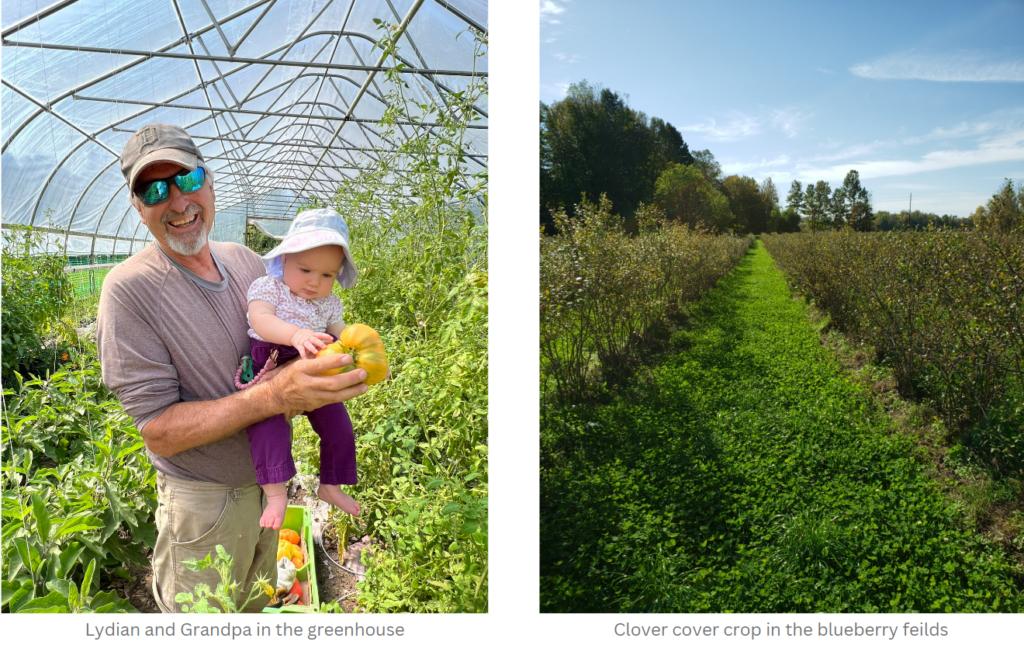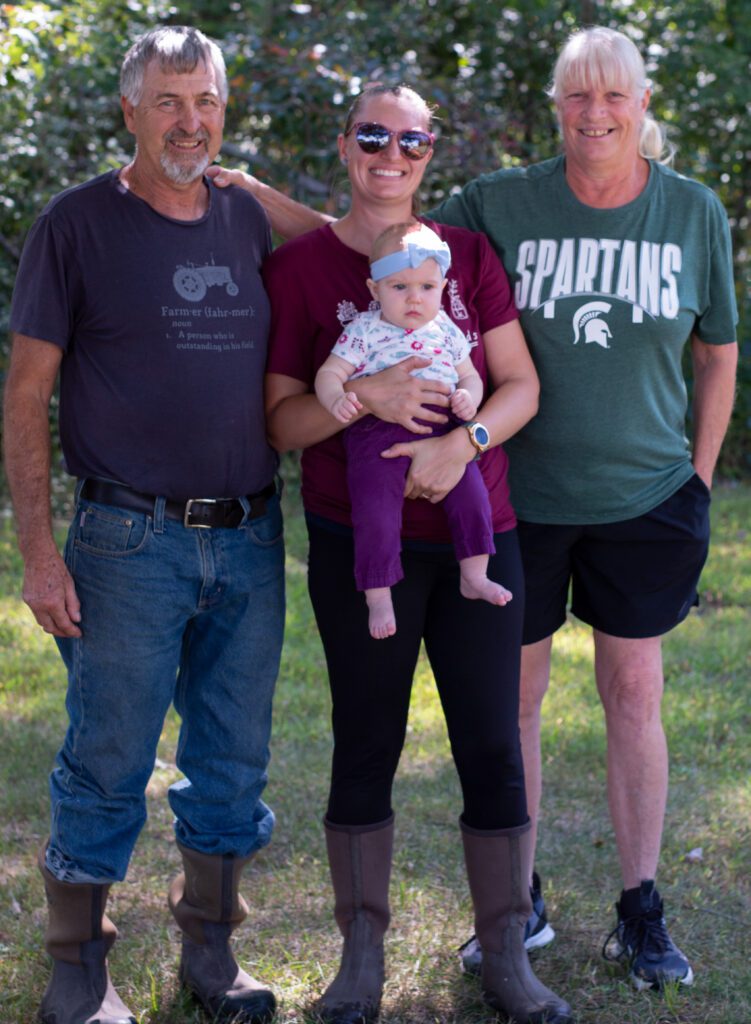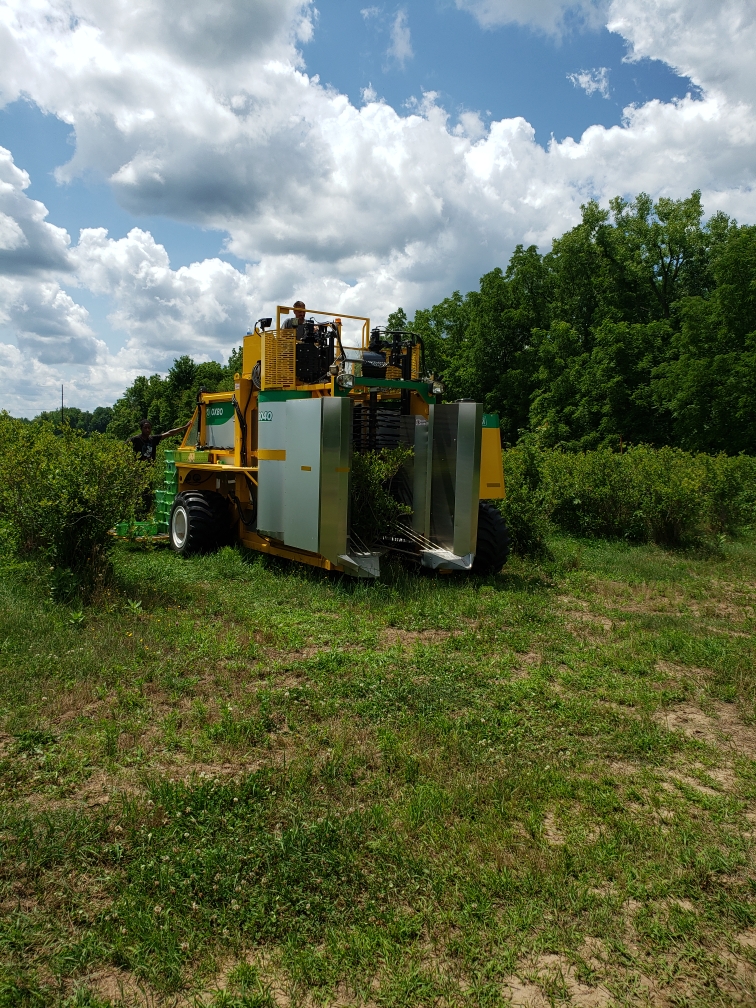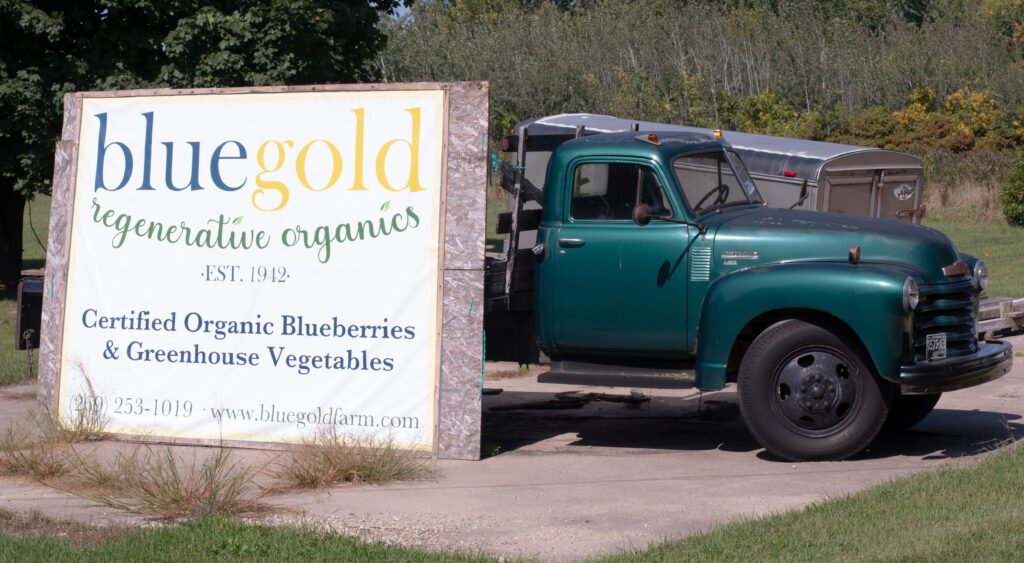Bluegold Regenerative Organics has adopted regenerative growing practices that successfully manage disease and insect pressure
Located just 10 miles from the shores of Lake Michigan, Bluegold Regenerative Organics sits in the heart of Michigan’s blueberry country. Michigan leads the country in blueberry production, with approximately 21,000 acres planted across 600 farms. The sandy, acid soils of the lower peninsula’s southwest coast are poorly suited for crops other than blueberries and cranberries. In addition, the region’s proximity to Lake Michigan means that winter temperatures are slightly warmer than inland.
Bluegold’s choice of crop may be typical for the region, but their practices are anything but.
John Smith’s 80-acre farm was established by his grandfather in 1941. He and his wife, Mary Ann, were able to purchase the farm from John’s father in the ’90s. Around the same time, their daughter, Devin, was born. Devin is now the farm manager, and with the birth of her daughter, the family is proud to call their operation a five-generation family farm.
Transitioning Practices
John has adopted the motto “healthy soil, healthy fruit and vegetables, healthy mind, healthy spirit.” These weren’t always the farm’s goals, though. Before transitioning to organic 10 years ago, John had followed his extension agent’s recommendations regarding pesticide and fungicide applications. He sprayed his 30 acres of blueberries weekly, and if it rained before the chemicals had dried, he sprayed again.
While picking berries for his family, John began to question the poisons he used. He began working with Dane Terrill of Crop Services International after seeing Dane speak at the Acres U.S.A. conference. CSI has been an invaluable resource for John and his family as they transitioned to regenerative and organic practices.
Before transitioning to regenerative practices, John had insect pressure under control, but he still struggled with disease. His plants suffered from mummy berry, Phomopsis canker, and anthracnose. Since transitioning to organic, Bluegold has been able to successfully manage both disease and insect pressure. The key to their success is compost tea.
In the barn where John and Devin brew their compost tea, an IBC tote with the top cut off sits against the back wall. A jacuzzi pump mounted above the tote blows air through PVC pipes running to the bottom of the tote. The pipes running along the bottom have small, evenly spaced holes drilled in them to allow air to escape. Once the tote is filled with water, worm castings and black fly frass are put in a filter sock and submerged in the water. The tea is then brewed for 12 to 18 hours.

John also adds a small amount of Bt to the solution before brewing, allowing him to propagate it along with the beneficial microorganisms in the worm castings. He also adds liquid fish, kelp and specific trace minerals (chosen based on sap analysis) to the tea. In the past, he has included different fertilizer materials such as micronized coral calcium. Once prepared, the compost tea is filtered through a 10-micron filter sock and sprayed every 7 to 10 days. According to John, the black fly frass helps the tea stick to the leaves of the blueberries.
John also applies mineral-amended compost in the fall and heat-treated poultry pellets in the spring. The pellets are applied at two critical points: bud break and petal drop.
Soil and Pest Control
When it comes to soil pH, Bluegold’s practices diverge radically from the recommendations of extension agents. Many land-grant universities recommend a soil pH of 4.2 to 4.5 for blueberries. Michigan State University is adamant in its recommendation that blueberries require acid soils; Bluegold’s experience has proven otherwise.
In The Anatomy of Life & Energy in Agriculture, Dr. Arden B. Andersen writes, “With ideal nutrient balances, the ideal soil pH for all soils and all crops is 6.4 … pH is a trailing indicator, an effect, not a cause. Balance the nutrients and let the pH fall where it may.” Based on the recommendations of CSI, John has done just that. His pH is now 5.8. When asked why conventional growers continue to target acid soil conditions, Devin said, “I think with the conventional growing method, they’ve kind of just had that drilled into their brain — you need to keep your pH at this certain number because that’s where blueberries are happy. When we started working with Dane, we basically had to unlearn that.”
In his pursuit to foster healthy soil, John has also incorporated cover crops into his system. By planting daikon radish on parts of the farm where ponding occurred, he has been able to reduce or eliminate the problem. He has also planted a mix of jerry oats, Dutch white clover, sub clover, crimson clover, fava beans, annual rye, cowpeas and buckwheat. Sowing is accomplished simply with a grass-seed spreader from a big box store.

In addition to plant nutrition, John and his family have turned to beneficial insects to help them manage pest pressure on the farm. They have planted some beneficial insect habitat, but the insect that continues to pose a challenge is spotted wing drosophila. SWD is an invasive fruit fly from East Asia. The female fly lays its egg in the ripe or ripening blueberry. While the fruit may be scarred when the egg is laid, it is the larva within the fruit that does the most damage. Conventional growers have powerful insecticides at their disposal.
On his certified organic farm, John is more limited. He could use Entrust (an OMRI-approved insecticide), but it’s very expensive. In addition to the cost, John isn’t interested in simply swapping out conventional inputs for organic ones. At a conference for blueberry growers, Devin met an entomologist from Michigan State University who was looking for farms willing to participate in a study relating to SWD. The idea is to release a parasitic wasp from SWD’s native range. This will hopefully provide the predation that is not currently present on Michigan berry farms. As far as Devin and her father know, they are the only certified-organic farm participating in the study. They believe the wasp may have a more significant impact on their farm because they are not spraying insecticides that would inadvertently knock back the wasp’s population.
The efforts made by John and his family have not gone unnoticed by their customers. Recently, a U-pick customer commented on the shelf life of the berries she bought. She would often leave her berries on the counter overnight or even for a couple of days before freezing them. When she left out blueberries from a conventional U-pick farm, the berries became soft and the juice had leached out by the next morning. In addition to shelf life, customers mention superior flavor. The Brix level of Bluegold’s blueberry leaves runs from 12 to 18. The feedback John and his family receive further supports the idea that higher Brix levels correlate to better flavor and aroma.
Marketing Concerns
While Bluegold’s transition to organic has led to increased fruit quality with less insect and disease pressure, it has not necessarily led to greater sales. After 60 years of membership, John and his family left the Michigan Blueberry Growers Association Co-op. The co-op wanted John to cease compost tea applications 90 days prior to harvest. Because compost tea makes up the bulk of his disease control and plant nutrition, he couldn’t comply with the request. Devin said, “It was just more important for us to align with our morality and take our farm in the direction of health and wellness.”

This has posed a major problem for the farm. For the past 60 years, they have had a guaranteed market for their fruit. Now they are scrambling to find a new solution. One option they are pursuing is to diversify and sell direct to consumers. This past season, John and his family sold annual vegetables in addition to their blueberries at a couple of local farmers markets. Next year they’ll be launching a CSA. Because there aren’t very many certified-organic blueberry growers in the area, John is finding it difficult to secure higher prices for his organic fruit on the wholesale market. Processors in the area aren’t able to handle organic berries separate from conventional berries, and John doesn’t have the capacity to process them himself. This past season, a sour business deal left the family with thousands of dollars’ worth of ripe berries and nowhere to sell them. Bluegold has no trouble growing healthy organic blueberries that are largely immune to insect and disease pressure; they simply struggle to sell them.
While this past season brought its share of troubles, John and his family are optimistic about the future of their farm. While they are not achieving the yields of their conventional neighbors, they have no interest in returning to toxic sprays. John transitioned to regenerative farming because he cares deeply about the health of his family and farm.
With a generational transition taking place, and with the search for new markets, it’s a unique time for Bluegold Organics. The bottom line is that the family is sticking firm to their principles.
“We love what we do,” Devin said. “We love that we can do it as a family. Now that I have my daughter, that’s given me a whole new drive because I want to build this farm and set up something for her future. She’s in the soil and among everything, and she’ll grow up farming just like I did and probably to love it like I did.”

Learn more about Bluegold Organics
facebook.com/bluegoldorganics
https://bluegoldfarm.square.site
Instagram: @bluegold_regenerative_organics
Phone: 269-906-9171
Lucas Hubbard operates a market garden in southern Michigan. Together with his wife, he is working to develop a farm that feeds his local community while benefiting the natural world around him.














